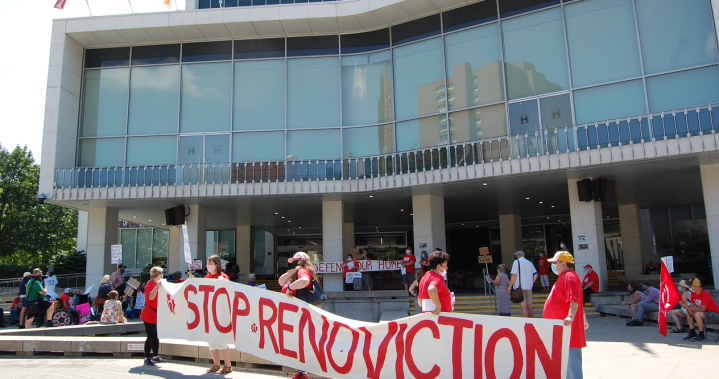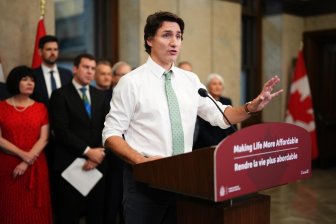Hamilton, Ont., is close to introducing a first-of-its-kind renoviction bylaw in the province that will force landlords to obtain licences to legitimize repairs they make to their properties.
The new legislation, carried 13-0-2 in a committee vote Wednesday, forces property owners to apply for a special permit for their rental addresses at a cost of around $700 when seeking a provincial N-13 notice — ending a tenancy due to a desire to demolish, repair or convert a rental unit.
University of Waterloo professor Brian Doucet, who studied housing insecurity and recorded findings in the Hamilton Neighbourhood Change Research Project, characterizes the bylaw as a movement that will be “blazing a trail that others in Ontario will soon follow.”
He says provisions that clearly outline “pathways and expectations” ensuring a return when upgrades are done and binding landlords with tenants throughout the entire renovation process are key elements.
“This proposed bylaw clearly stipulates that the onus of responsibility of the right to return is most definitely a shared one between landlords who own the home and tenants who live in it and consider it their homes,” Doucet told a committee Wednesday.
Ward 3 Coun. Nrinder Nann says the bylaw will be a “complementary piece” to Ontario’s Residential Tenancy Act, which governs and outlines rights for landlords and tenants amid residential rental agreements.
She says a former ordinance created in New Westminster, B.C. is the inspiration for the Hamilton edict, which employs the use of inspectors to probe buildings to make sure they meet property standards.
“We’re looking for some information on paper first, so that information will then trigger whether or not any further inspection is needed,” Nann explained.
Get the latest National news.
Sent to your email, every day.
“We do know that without having this kind of information available to the municipality, we haven’t been able to verify whether or not substantive renovations took place.”
For December, Rentals.ca estimated the average rent for a single-bedroom unit went up another 3.5 per cent year over year in the city to around $1,825 per month.
It’s a number tearful delegate and ODSP recipient Colleen Langmead told councillors was “beyond her monthly allowance.”
Langmead said she was offered a “cash for keys” settlement on Monday to vacate months after the eight-unit residential building she lives in on Barton Street was taken over by a new owner.
Since the change, she said her neighbours have been whittled down to just three.
Requiring accessibility aids in her home and space for a mobility scooter she told a committee she didn’t feel she could accept the landlord’s offer.
“I no longer have any faith that my rights of first refusal would be honored, anyway,” Langmead said.
The legislation also draws from rules that have been in effect for about five years in Toronto and Mississauga calling on inspectors to licence landlords and inspect buildings to make sure they meet property standards.
Existing provincial protections require landlords to give the tenants written updates on the status of a renovation and when the unit is ready for occupancy.
Proposed fines for non-compliance have been set at up to $500 a day, but are subject to scrutiny by Ontario’s Ministry of the Attorney General.
However, Nann says those updates are not typically followed up and confirmed by the province or a given municipality.
“Because there’s no ability to kind of track whether that was a minor reno or major reno,” she said.
“So all of that information will be now available to the city to be able to assist our tenants.”
City estimates have revealed 34 per cent of households in Hamilton are renters with an estimated 23 affordable units disappearing for every new affordable unit being built, equating to a ten-year loss of around 16,000 rental units priced below $750 per month.
In 2022, the city said some 6,000 households were on a waitlist for affordable housing.
Annual costs associated with the bylaw run around $950,000, broken down into eight full time staffers, vehicles, outreach and communication efforts among other operations costs.
Upon approval, one-time total costs in 2024 are expected to hit $2 million.
The money will come partly from cost recovery through the distribution of licenses and partly through the city’s yearly tax levy.
Nann says she’s been sharing the progress of the Hamilton bylaw with councillors in Ottawa, Windsor and Peel Region seeking to implement similar solutions.
In January, the city of London said they received some provincial support for a plan to limit or prevent renovictions after a committee ordered local staff to study a potential bylaw requiring landlords to share copies of the N-12 and N-13 eviction notices.
The new bylaw still needs to be ratified by a Hamilton council vote next week.

© 2024 Global News, a division of Corus Entertainment Inc.




